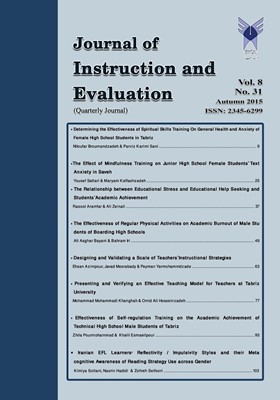The Effect of Mindfulness Training on Junior High School Female Students` Text Anxiety in Saveh
Subject Areas : Educational PsychologyYousef Sattari 1 * , Maryam Kaffashzadeh 2
1 - گروه علومتربیتی، واحد تبریز، دانشگاه آزاد اسلامی، تبریز، ایران
2 - گروه روانشناسی عمومی، واحد تبریز، دانشگاه آزاد اسلامی، تبریز، ایران
Keywords: Anxiety, mind fullness,
Abstract :
The present study aimed at investigating the effectiveness of mind fullness training on students` test anxiety in Saveh. The participants of the study were all of the students of junior high schools in Saveh form whom a sample of 49 students, through cluster-random sampling in two groups of experimental and control, were chosen. Splillbergers test anxiety questionnaire was used as the research instrument. The research design was semi experimental with two experimental and control groups and a pretest and a post test. The independent variable of the study was mindfulness training. The hypotheses were analyzed through covariance analysis. The results showed that mindfulness instruction is a quite effective method to decrease test anxiety and can be useful in the case of anxiety excitement and recognition.
منابع
ابوالقاسمی، عباس؛ مهرابیزاده، علی؛ نجاریان بهمن، شکرکن، حسین (1383). اثر بخشی روش درمانی آموزش ایمن سازی و حساسیت زدایی منظم بر اضطراب امتحان در دانشآموزان. مجله روان شناسی دانشگاه تربیت مدرس، شماره29، 1-19.
آذرگون، حسن؛ کجباف، محمدباقر؛ مولوی، حسین؛ عابدی، محمدرضا (1388). اثر بخشی آموزش ذهن آگاهی بر کاهش نشخوار فکری و افسردگی دانشجویان دانشگاه اصفهان. دانشور رفتار، 34؛ 13-22.
بیابانگرد، اسماعیل. (1387). مهارتهای تسلط بر ترس قبل از امتحان. تهران انتشارات رشد.
بیرامی، منصور؛ عبدی، رضا (1388). اثر بخشی تأثیر آموزش فنون مبتنی بر ذهن آگاهی در کاهش اضطراب امتحان دانشآموزان. مجله علوم تربیتی، سال دوم، شماره6، صص 35-54.
کاویانی، حسین؛ جواهری، فروزان؛ بحیرانی، هادی (1384). اثر بخشی شناخت درمانی مبتنی بر ذهن آگاهی در کاهش افکار خود ایند منفی، نگرش ناکارآمد، افسردگی،و اضطراب: پیگیری 60 روزه. تازههای علوم شاختی.7(1)،49-59.
موسویان، نرگس؛ مرادی، علیرضا؛ میرزایی، جعفر، شیدفر، فرزاد؛ محمودی کهریز، بهرام؛ طاهری، فاطمه (1389). اثر بخشی شناخت درمنی مبتنی بر ذهن آگاهی بر کاهش چاقی. اندیشه و رفتار،4(16)،49-59.
نادری، عزت الله، و سیف نراقی، مریم (1381). روشهای تحقیق و چگونگی ارزیابی آن در علوم انسانی (ویراست چهارم). تهران: بدر.
نریمانی، محمد؛ آریاپوران، سعید؛ ابوالقاسمی، عباس؛ احدی، بتول (1389). مقایسه اثر بخشی آموزش های ذهن آگاهی و تنظیم هیجان بر سلامت روان جانبازان شیمیایی. مجله روانشناسی بالینی، سال دوم، شماره4 (پیاپی8)، صص 61-72.
Baer, R. A., Smith, G. T., Hopkins, J., Krietemeyer, J. & Toney, L. (2006). Using self report assessment methods to eplore facets of mindfulness. Assessment, 13(1): 27-45.
Bihlmeijer, E., Prenger, R., Taal, E. & Cuijpers, P.(2010). The effects of mindfulness based stress reduction therapy on mental health of adults with a chronic medical disease: a Meta analysis. Journal of Psychosomatic Research, 68: 539-544.
Bishop, S. R., Lau, M., Shaoiro, Sh., Carlson, L., Anderson, N. D., Carmody. J., Segal, Z. V., Abbey, S., Speca, M., Velting, D. & Devins. G,. (2003). Mindfulness: A proposed theoretical operational definition. Clinical psychology: Science and Practice, 11(3), 230-241
Broen, K. W. & Ryan, R. M.(2003). The benefits of being present: mindfulness and its role in psychological well- being. Journal of Social Psychology, 84: 822-848.
Cardactiotto, L. A. (2005). Assessing mindfulness: the development of a bi- dimensional measure of awareness and acceptance. Doctoral dissertation. University of Drexel, USA.
Carlson, L. E., Speca, m., Patel, K. D. & Goodey, E. (2003). Mindfulness based stress reduction in relation to quality of life mood, symptoms of stress and immune parameters in breast and prostate cancer outpatients. Psychosomatics medicine, 65, 571-581.
Dusek, J. (1990). The development of test anxiety in children. In I. sarason, Test Anxiety: theory, research and applications, 87-110. Hillsdale, NJ: Lawrence Erlbaum Associates Publishers.
Evans, S., Ferrando, S., Findler, M., stowell, C., smart, C. & Haglin, D. (2008). Mindfulness based cognitive therapy for generalized anxiety disorder, 22,716-721.
Goldin, P. R. & Gross, J. J. (2010). Effects of mindfulness based stress reduction in social anxiety disorder. Emotion, 10, 83-91.
Greeson, J. M., Brainard, G. c. & Rosenzweig, S. (2001). Mindfulness based stress reduction quality of life in aheterogeneous patient population. General Hospital Psychiatry, 23,183-193.
Hayes, S. C. & Wilson, K. G. (2003). Mindfulness: Method and process. Clinical Psychology, 10, 161-165.
Kabat-zinn, J.(2003). Mindfulness based intervention in contex: Past, present, and future. Clinical Psychology: Science and Practice, 10, 144-156.
Ma, S. H. & Teasdel, J. D. (2004) mindfulness based cognitive therapy for depression: replication and exploration of deferential relapse prevention effects. Consulting and clinical psychology, 72, 31-40.
Moore, A. & Malinowski, P. (2009). Meditation, mindfulness and cognitive flexibility. Consciousness and Cognitive, 18(1), 176-186.
Sample, r. J., Reid, E. F. & Miller, L. (2005). Treating anxiety with mindfulness: An open trial of mindfulness training. For Anxiety children Journal of Cognitive Psychotherapy: An International Quaterly, 19, 372-392.
Sapp, M. (1993). Rest anxity: Applied research assessment, and treatment interventions. Lanham, MD: university Press of America.
Teasdel, J. D., Segal, Z. V., Williams, J. M. G., Ridgeway, V, A., Soulsby, J. & Lau, M. A (2000). Prevention of relapse in major depression by mindfulness based cognitive therapy. Consulting and clinical psychology, 68,615-623.
Zeidan, F., Johnson, S. K., Diamond, B. J., David, Z., & Goolkasian, P. (2010). Mindfulness meditation improves cognition. Conscious Cognitive, 19, 597-605.

